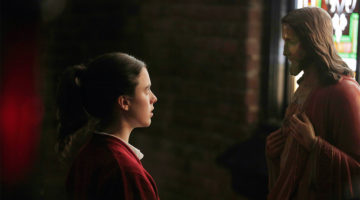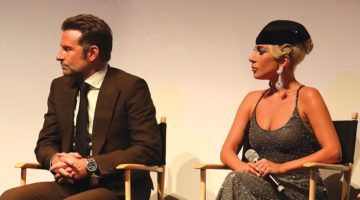TIFF 2012 Review: End of Watch
David Ayer is the George Romero of LAPD films. Romero has built an impressive cinematic career with the traditional zombie as his focus. The words ‘of the Dead,’ or ‘of the Living Dead,” appear in title after title, as he continues to churn out piece of cinema that fit nicely into one genre, some mediocre, and some great.
Now, Ayer has not been working nearly as long, and does not so much define a genre as refresh it, but he favours the gritty cop drama in his writing and directing opportunities. He directed Street Kings and Harsh Times (mediocre), and wrote on Dark Blue, S.W.A.T. as well as the acclaimed Training Day (great).
And like Romero once did with Diary of the Dead in an effort to alter slightly his prevailing tendencies, Ayer has opted to create a film with the documentary style of filmmaking.
End of Watch is a superbly compelling and realistic LAPD drama, Ayer’s best since Training Day, but it is beaten and killed by the decision to use various cameras and home-video techniques to propel the story. A pair of young cops in Jake Gyllenhall and Michael Peña, brotherly, goofy yet tough, are on the beat, and we get to watch them through an assortment of conveniently and strangely placed and simply annoying cameras around their world.
Officer Taylor (Gyllenhall) explains that he is doing a project for his film class (apparently he is an LAPD cop and he is in school, yet I don’t know exactly when), and all his coworkers save for partner Officer Davis, are just as bewildered and annoyed at him as I am.
It is utterly superfluous, and throughout the film it offers absolutely nothing to the narrative save for a couple of interesting shots that could otherwise still be incorporated. Ayer seems to know it too, as the POV style (the pair are either holding cameras or wearing them) fades more and more as the film goes on. Still, Ayer is too insistent on this, even going so far as to having two different gangs carrying around cameras.
One when gang is targeted by the other in a drive by shooting, either side conveniently has members recording what is going on. For what reason, we don’t know. Maybe they all have film school projects, and if they do, their audience is likely as visually uninterested as Ayer’s.
So, if you can get by that bizarre and unnecessary instrument of filmmaking, there is a genuinely interesting story about two partners, and very good friends, trying to balance their careers and their personal lives, letting their curiosity endanger both worlds. The two actors have effusive charm, and get along with one another wondrously. Some of the best scenes are just the two of them sitting in a car talking, often about Davis’s wife and extended Hispanic family, or Taylor and his ever-growing feelings of affection for his new girlfriend Janet, played by the incredibly lovely Anna Kendrick.
And because the pair is so fun to listen to, Ayer will surprise you with the real world outside the patrol car, one with unforgiving criminals, and plenty of flying bullets, thrusting knifes, and heavy fists.
It is a film that builds so intensely, with an unforgiving plot and compelling characters that pull you in, while the camera angles push you away. As the documentary look fades, we see the characters more intimately (one would think the reverse should be true), and so, we have quite a bit invested leading up to, as expected, a bloody and uncomfortable confrontation; as it Ayer’s signature.










